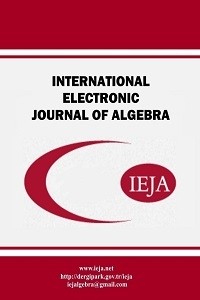PERFECT NUMBERS WITH IDENTICAL DIGITS IN NEGATIVE BASE
We study perfect numbers which are repdigits in a given negative
Keywords:
Perfect number repdigit,
___
- K. A. Broughan, S. G. Sanchez, and F. Luca, Perfect repdigits, Math. Comp., 82(284) (2013), 2439-2459.
- K. A. Broughan and Q. Zhou, Odd repdigits to small bases are not perfect, Integers, 12(5) (2012), 841-858.
- Y. Bugeaud, F. Luca, M. Mignotte and S. Siksek, Perfect powers from products of terms in Lucas sequences, J. Reine Angew. Math., 611 (2007), 109-129.
- C. Frougny and A. C. Lai, Negative bases and automata, Discrete Math. Theor. Comput. Sci., 13(1) (2011), 75-93.
- V. Grunwald, Intorno all'aritmetica dei sistemi numerici a base negativa con particolare riguardo al sistema numerico a base negativo-decimale per lo studio delle sue analogie coll'aritmetica ordinaria (decimale), Giornale di matematiche di Battaglini, 23 (1885), 203-221, 367.
- W. Ljunggren, Some theorems on indeterminate equations of the form xn ? 1=x ? 1 = yq, Norsk Mat. Tidsskr., 25 (1943), 17-20.
- F. Luca, Perfect Fibonacci and Lucas numbers, Rend. Circ. Mat. Palermo, 49(2) (2000), 313-318.
- F. Luca, Multiply perfect numbers in Lucas sequences with odd parameters, Publ. Math. Debrecen, 58(1-2) (2001), 121-155.
- R. B. Nelsen, Even perfect numbers end in 6 or 28, Math. Mag., 91(2) (2018), 140-141.
- P. Pollack, Perfect numbers with identical digits, Integers, 11(4) (2011), 519- 529.
- P. Pollack and C. Pomerance, Some problems of Erd}os on the sum-of-divisors function, Trans. Amer. Math. Soc. Ser. B, 3 (2016), 1-26.
- I. SageMath, CoCalc Collaborative Computation Online, 2017. https://cocalc.com/.
- H. N. Shapiro, Introduction to the Theory of Numbers, Pure and Applied Mathematics, A Wiley-Interscience Publication, John Wiley & Sons Inc., New York, 1983.
- T. N. Shorey and R. Tijdeman, Exponential Diophantine equations, Cambridge Tracts in Mathematics, 87, Cambridge University Press, Cambridge, 1986.
- ISSN: 1306-6048
- Yayın Aralığı: Yılda 2 Sayı
- Başlangıç: 2007
- Yayıncı: Abdullah HARMANCI
